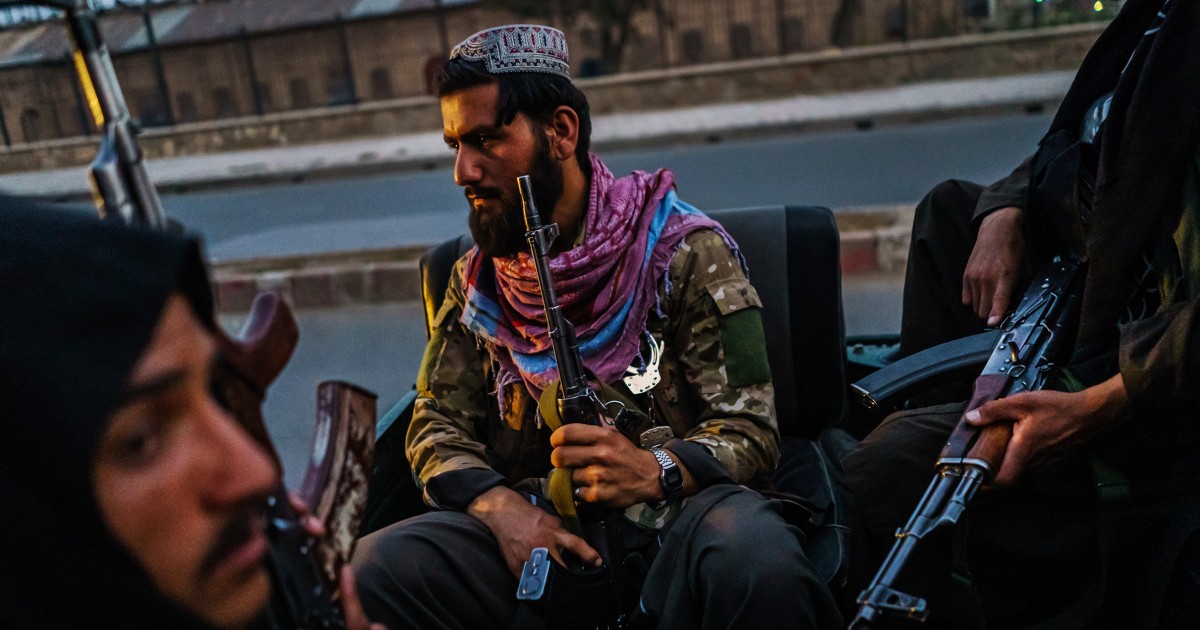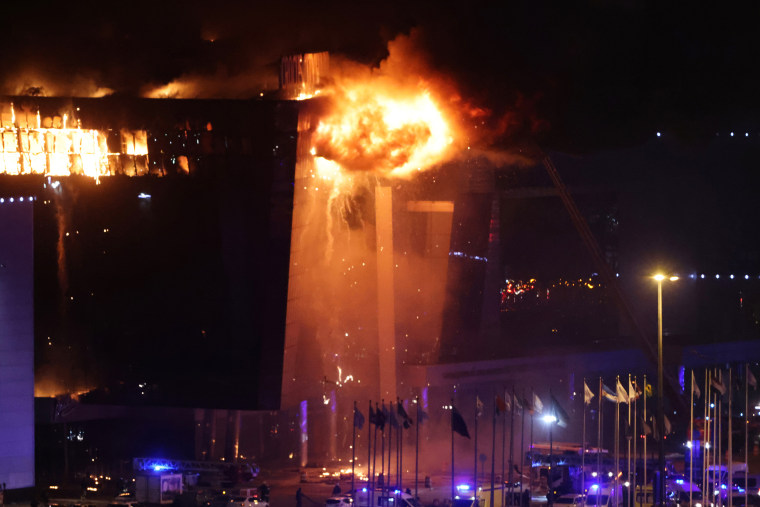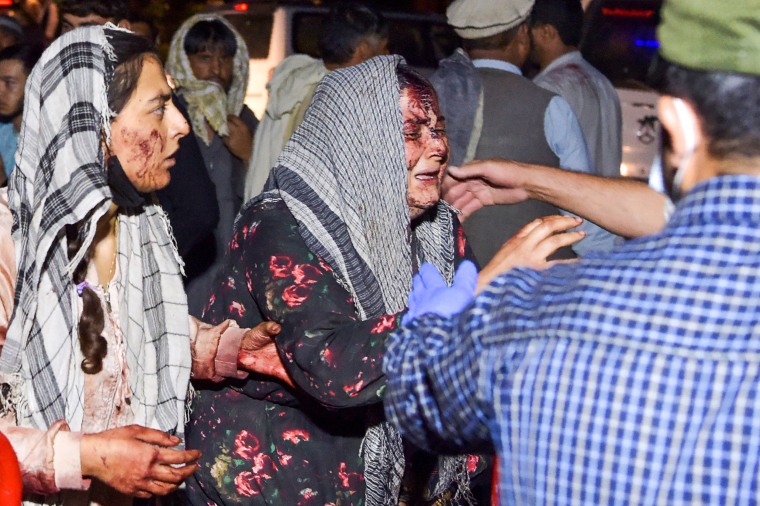World
The enemy of my enemy: Biden admin weighs working with the Taliban to combat ISIS-K

Facing a growing global terrorist threat, Biden administration officials are debating expanding cooperation with the Taliban regime in Kabul to help track ISIS-K, the branch of the terrorist group active in Afghanistan, according to two sources familiar with the matter and a former U.S. official.
The administration and other Western governments are scrambling to keep up with the mounting danger ISIS-K poses. Before this year, U.S. and other Western officials believed ISIS-K had the intent but not the ability to orchestrate attacks abroad. But that view changed with the horrific attack at Moscow’s Crocus City Hall concert venue on March 22, which killed 130 people and injured hundreds more. It was the deadliest terrorist attack in Europe since 2004. ISIS-K also launched a major attack in Iran this year that killed dozens, and other plots were disrupted in Europe.
But the U.S. military’s withdrawal from Afghanistan and declining Western influence in Africa have weakened Washington’s capacity to gather intelligence on the various offshoots of ISIS.
“We have a very, very limited ability to see what they’re doing,” said a former military officer with experience in the region.
As a result, the administration is weighing sharing more information with the Taliban about the Khorasan branch of ISIS, often referred to as ISIS-K.
The Taliban sees ISIS-K as a threat to its rule and has launched a series of attacks on the group. But there is deep distrust between the West and the Taliban after a 20-year-long war that pitted U.S.-led forces against the Afghan militants, who seized power as American troops withdrew in August 2021.
“There’s an internal debate about whether to try to work more with the Taliban,” a former senior official said. Some members of Congress also favor the approach, though they argue the U.S. would have to demand concessions from the Taliban in return, including ensuring more rights for Afghan women.
Some officials favor reopening the U.S. Embassy to allow for more cooperation between U.S. intelligence agencies and the Taliban regime, though Washington has yet to recognize the Taliban leadership as the country’s legal government.
A spokesperson for the White House National Security Council said that there were no plans at the moment to reopen the embassy but that the U.S. does talk to the Taliban.
“While the United States has no intention of reopening an embassy in Afghanistan at this time, we do engage pragmatically with a wide variety of Afghans, including the Taliban, through our diplomats based in Doha,” the spokesperson said in an email.
The spokesperson added that “the United States is acutely focused on terrorism and over the horizon threats, working both unilaterally and with our partners to disrupt and degrade ISIS-K and other terrorism-related threats around the world.”

It’s unclear how much there is to gain from even a limited partnership with the Afghan Taliban, and some officials oppose the move, fearing the Taliban would use the cooperation as a way to push Washington to recognize its authority and tolerate its human rights abuses.
A study group of former senior officials, diplomats and regional experts at the U.S. Institute for Peace think tank issued a report in May calling for stepping up intelligence cooperation with the Taliban to counter ISIS-K.
“Sharing intelligence on shared concerns such as ISIS-K is the practical thing to do, and our group was generally supportive of ongoing U.S. government efforts to maintain such channels with the Taliban,” said Asfandyar Mir, a senior expert on counterterrorism at the U.S. Institute for Peace. “We think those can and should be upgraded.”
U.S. intelligence agencies declined to comment.
After the chaotic exit of U.S. troops from Afghanistan nearly three years ago, the Biden administration said it would retain an “over the horizon” ability to target terrorists in the country if necessary. Since then, it has conducted only one such operation in Afghanistan, a drone strike that killed Osama bin Laden’s successor as the head of Al Qaeda, Ayman al-Zawahiri, who was hiding at a safe house in Kabul.
Manhunts by drone or other means require precise, timely intelligence, which is less available without U.S. teams on the ground and sufficient surveillance in the area, former officials, military officers and experts said.
U.S. surveillance resources have been shifted to the Israel-Hamas conflict in Gaza, the war in Ukraine and the Navy’s effort to defend commercial shipping in the Red Sea from attacks by Houthi forces in Yemen, with targets in Afghanistan and Pakistan as less of a priority.
U.S. intelligence gathering in Africa has also suffered a setback.
In a series of coups in Niger and other states in the Sahel, anti-Western juntas have expelled the U.S. and French forces that had tracked ISIS for years.
Extremist groups in Africa do not appear to have the ability to organize terrorist attacks abroad, but if the current trajectory continues, that could change, experts said.
The Biden administration also has imposed more restrictions on decision-making for any unilateral military strikes against terrorist targets abroad. The report from the U.S. Institute of Peace recommended easing those rules without fully restoring the leeway given commanders during the war in Afghanistan.
The former military officer said the restrictions hamper efforts to fight ISIS-K, as well as what the officer called the Biden administration’s reluctance to order military strikes in Afghanistan.
“There’s an aversion to action,” the officer said.
But the National Security Council spokesperson said that the administration was determined to go after terrorist threats anywhere in the world and that President Joe Biden has ordered operations during his tenure that successfully targeted three key terrorist figures.
In addition to the strike that killed Zawahiri, Biden approved an operation in Syria against the then-leader of ISIS, Hajji Abdullah, and an operation in Somalia that resulted in the death of Bilal al-Sudani, a senior operative for ISIS’ global network.
“As President Biden has made clear, we are committed to finding and eliminating terrorist threats to the United States and to the American people, wherever they are hiding and no matter how remote,” the spokesperson said.
A senior administration official said that as a result of those “unprecedented” operations, “there has not been a single successful terrorism attack on the homeland on our watch.”
‘This menace’
In Afghanistan, the Taliban say that they have conducted a series of operations against ISIS-K in eastern provinces and killed many militants but that the group remains a threat.
“I think in some places, such as in eastern Afghanistan, including Kunar and Nangarhar provinces, the Islamic State people and their supporters were ruthlessly treated, but it helped us get rid of this menace,” a member of the Taliban’s security services told NBC News.
Another senior Taliban security official said he recently visited the country’s north to gather information about ISIS and found that it had a small but significant presence. The ISIS-K militants move between Syria and Afghanistan via Iran, the official added.
Taliban officials declined comment on information sharing with the U.S. or U.S. allies about ISIS-K.
According to a U.N. sanctions monitoring panel, the Taliban’s “efforts against ISIL-K [ISIS-K] appear to be more focused on the internal threat posed to them than the external operations of the group.”
The head of U.S. Central Command, Gen. Michael Kurilla, told lawmakers in March “that pressure has been intermittent and insufficient” by the Taliban and that the “lack of sustained pressure allowed ISIS-K to regenerate and harden their networks, creating multiple redundant nodes that direct, enable, and inspire.”
Edmund Fitton-Brown, a former British diplomat and now a senior adviser to the Counter Extremism Project, a nonprofit organization, said he was skeptical that the Taliban could be a reliable partner that would help the West prevent terrorist attacks by ISIS-K.

“I don’t think this is a counterterrorism relationship that has progressed very far, but I don’t think it’s been abandoned,” he said.
The Taliban says it has kept its commitment under an agreement signed during President Donald Trump’s tenure that Afghanistan will not be used as a launching pad for terrorist attacks abroad. But foreign governments and experts say a series of attacks, including in Pakistan and Turkey, as well as the large-scale attacks in Iran and Russia, can be traced to ISIS-K.
In the final chaotic days of the U.S. military’s withdrawal from Afghanistan, American commanders worked with the Taliban to try to maintain order around the Kabul airport and to pre-empt possible attacks by ISIS-K or other extremists. But the cooperation failed to avert a deadly bombing by ISIS militants at an airport entrance, which killed 13 U.S. troops and roughly 170 Afghan civilians.









